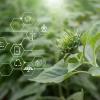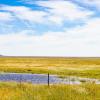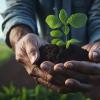
IIASA joins the LEAP-RE joint initiative of the European Union and African Union to advance the cooperation in research and innovation actions on renewable energy with the RE4AFAGRI project.
LEAP-RE - RE4AFAGRI aims at developing the state of the art of climate-water-energy – land-food-environment nexus modeling in rural areas of developing countries to bridge the current gap between large-scale and local-scale analysis approaches. The project aims to provide a set of open-source validated tools developed through analytical and empirical approaches that can be exploited by stakeholders in future applications. In addition, LEAP-RE - RE4AFAGRI aims to design business models that allow the implementation of integrated technological solutions in rural areas, based on identified best practices, regulatory obstacles and opportunities through the participation of African companies, public authorities and consortia of small owners. The ultimate goal is to support policy makers in defining policy frameworks that ensure that the identified business models can be successfully implemented by local entrepreneurs, while also meeting the technical and environmental requirements to achieve development goals in rural areas.
Main Results and Outputs
- Develop and publish openly of a set of validated tools developed through analytical and empirical approaches that can be exploited in future applications, such as an online interactive dashboard co-optimizing energy, environmental, and development outcomes under different future scenarios and objectives.
- Design and apply innovative business models that enable the implementation of integrated energy-water solutions in rural areas through the participation of African companies, public authorities and consortia of smallholder farmers.
- Support policy makers in defining policy frameworks that ensure that the identified business models can be successfully implemented by local entrepreneurs, while also meeting the technical and environmental requirements to achieve development goals in rural areas.
- Carry out in-person and online training courses for African researchers and stakeholders to disseminate the project outputs and foster its future utilization, both for the modeling platform and the business models developed.
Forthcoming activities: Building upon the success of the Joint Workshops held in Addis Ababa, Ethiopia, in October 2023, RE4AFAGRI is now launching online training courses beginning June 2024.
Learn more at the re4afagri webpage and dashboards: https://www.re4afagri.africa/
Partners
- HEAS A.G.(HEAS) (Switzerland)
- International Institute for Applied Systems Analysis (IIASA) (Austria)
- Politecnico di Milano (PoliMI) (Italy)
- Politecnico di Torino (UniTo) (Italy)
- University of Cape Town (UCT) (South Africa)
- TFE Africa (TFE) (South Africa)
- University of Rwanda (UR) (Rwanda)
- University of Zambia (UNZA) (Zambia)
Published papers:
Falchetta, G. , Vinca, A. , Troost, A., Tuninetti, M., Ireland, G., Byers, E. , Hafner, M., & Zulu, A. (2024). The role of agriculture for achieving renewable energy-centered sustainable development objectives in rural Africa. Environmental Development 52 e101098. 10.1016/j.envdev.2024.101098. Wamalwa, F., Maqelepo, L., Williams, N., & Falchetta, G. (2024). Solar irrigation potential in Sub-Saharan Africa: a crop-specific techno-economic analysis. Environmental Research: Food Systems 1 (2) e025001. 10.1088/2976-601X/ad5e82. Falchetta, G. , Vinca, A. , Trost, A., Tuninetti, M., Ireland, G., Byers, E. , Hafner, M., & Zulu, A. (2024). Achieving renewable energy-centered sustainable development futures for rural Africa. DOI:10.5194/egusphere-egu24-15943. In: EGU General Assembly 2024, 14-19 April 2024, Vienna. Awais, M. , Vinca, A. , Byers, E. , Frank, S. , Fricko, O. , Boere, E., Burek, P. , Poblete Cazenave, M., Kishimoto, P.N. , Mastrucci, A. , Satoh, Y., Palazzo, A. , McPherson, M., Riahi, K. , & Krey, V. (2024). MESSAGEix-GLOBIOM nexus module: integrating water sector and climate impacts. Geoscientific Model Development 17 (6) 2447-2469. 10.5194/gmd-17-2447-2024. Vinca, A. , Falchetta, G. , Ireland, G., Tuninetti, M., Awais, M. , Byers, E. , Semeria, F., & Giordano, V. (2023). The benefits of rural electrification to improve water access and irrigation in Sub-Saharan Africa, a water-energy-land assessment framework applied to Zambia. In: EGU General Assembly 2023, 23-28 April 2023, Vienna. Falchetta, G. , Adeleke, A., Awais, M. , Byers, E. , Copinschi, P., Duby, S., Hughes, A., Ireland, G., Riahi, K. , Rukera-Tabaro, S., Semeria, F., Shendrikova, D., Stevanato, N., Troost, A., Tuninetti, M., Vinca, A. , Zulu, A., & Hafner, M. (2022). A renewable energy-centred research agenda for planning and financing Nexus development objectives in rural sub-Saharan Africa. Energy Strategy Reviews 43 e100922. 10.1016/j.esr.2022.100922. Falchetta, G. (2021). Energy access investment, agricultural profitability, and rural development: time for an integrated approach. Environmental Research: Infrastructure and Sustainability 1 (3) e033002. 10.1088/2634-4505/ac3017.
News

12 December 2023
Giacomo Falchetta receives the IAMC Best Online Poster Award

20 October 2023


